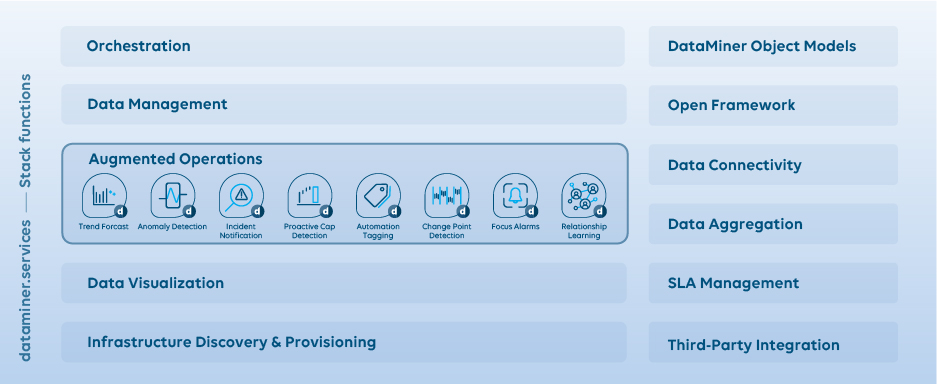Augmented Operations
Ensure maximum uptime by leveraging big data and AI.

Make the shift from reactive to proactive management.
DataMiner Augmented Operations continuously and autonomously learn from your data, making DataMiner increasingly intelligent.
The technology captures, correlates, and analyzes all data sources in real time using state-of-the-art big data and artificial intelligence (AI) technology. It learns the relationships between metrics and generates alarms when anomalies are detected, improving performance and reducing system downtime.
Additionally, DataMiner Augmented Operations reduce setup and configuration time, increase management efficiency, and provide unprecedented insights into the most complex operations in an intuitive and easy manner. Combined with the unique end-to-end value proposition of DataMiner, DataMiner Augmented Operations are indispensable for managing tomorrow’s operational ecosystems proactively.
Tip
For more information:
- Learn to leverage DataMiner's AI capabilities—from proactive issues detection to streamlined incident response—so you can stay ahead of potential problems and work more effectively, with the free DataMiner AI course.

- A 60-min. webinar from our Experts & Insights series, showing how DataMiner leverages AI technology, is available at Experts & Insights - Augmented Operations

- A high-level introduction video (50 minutes) is available in our Inspire Rewind section on our Community site, at Inspire Rewind – Augmented Operations

Note
Are you struggling with something? Are there use cases you want us to tackle? Or do you simply have a great idea on how to improve DataMiner’s AI capabilities? Then let's talk AI and share your thoughts with Team AI.
Trend Prediction
Automatic prediction on any numeric metric with enabled time tracing.
The AI-powered forecasting functionality automatically learns the behavior and evolution of the operational system and its performance metrics, and extends that towards the future, allowing the operator to gain more in-depth insights and manage the operation more proactively.
Tip
For more information:
Proactive Alarms
Proactively detect critical highs and lows before they occur.
The proactive cap detection solution uses the Trend Prediction functionality to provide an automated risk analysis for metrics that are likely to hit important key values. By continuously monitoring and modeling the trend of the metrics, proactive cap detection will give the user an early warning if it predicts problems for a metric in the future. This enables a proactive way of tackling emerging issues and prevents issues from affecting services.
Tip
For more information:
- Course: Trend prediction and proactive cap detection
- Video about Intelligent Fault Detection (covering Proactive Cap Detection, among others)

- Advanced analytics in the Alarm Console
Pattern Detection
Automated application of tags to describe content.
Through automatic tagging functionality, behavioral patterns in trend data can be easily tagged to enrich an operation with context information and empower advanced behavioral monitoring.
Based on AI pattern matching algorithms, instances of tagged patterns are automatically recognized and labeled both in historical trend data and in the new incoming real-time data.
Tip
For more information:
- Course: Pattern Matching
- DataMiner Automated Tagging use case 1
- DataMiner Automated Tagging use case 2
- Video about Intelligent Fault Detection (covering Automated Tagging, among others)

- Blog post about Pattern Matching in DataMiner 10.1
- Blog post about Multivariate Pattern Matching
- Advanced analytics in trend graphs
- Working with pattern matching
Change Point Detection
Automatic detection of changes in metric behavior.
DataMiner’s change point detection solution automatically identifies both abrupt and subtle behavioral changes in the trend data of individual performance metrics in (semi) real time. Detection of a change in level, trend, or variance can be applied for early fault detection, as a user can be warned about previously unseen or rare behavior. Knowledge of change points also proves useful in improving the modeling and prediction of the metric behavior, and in the automatic detection of relationships between metrics or DataMiner objects.
Tip
For more information:
- Video about Intelligent Fault Detection (covering Change Point Detection, among others)

- Blog post about Automatic Detection of Frozen States
- Blog post about User Feedback on Behavioral Anomalies.
- Advanced analytics in trend graphs
Anomaly Detection
Proactive alarms for unusual metric behavior.
An anomaly significance scoring mechanism augments the change point detection solution and identifies the changes in metric behavior that are truly exceptional or unexpected, taking historical metric behavior into account.
Tip
For more information:
- Course: Behavioral Anomaly Detection
- Video about Intelligent Fault Detection (covering Anomaly Detection, among others)

- Advanced analytics in the Alarm Console
- Working with behavioral anomaly detection
- Kata #12: Automatically detect anomalies with DataMiner

Incident Identification
Autonomous grouping of alarms linked to the same root cause.
The Automatic Incident Tracking feature autonomously learns about system behavior and leverages the rich context of alarms and relational information available in a DataMiner System to automatically correlate alarms belonging to a specific incident. No manual pre-analysis or time-consuming setup and configuration of correlation logic is required.
Tip
For more information:
- Course: Incident Tracking
- Video: Focus on the Root of Issues with Incident Analysis

- Blog post about Automatic Incident Detection
- Automatic Incident Tracking
Focus Alarms
Automatic alarm noise reduction.
Based on an analysis of the alarm history and its patterns, the focused alarms option reduces alarm noise and allows easy focus on the events and incidents that are truly impactful. Focus alarms only show the "unexpected" alarms and ignore recurring alarms due to bad template configuration.
Relationship Learning
Get insights based on learned relations between the numerous integrated metrics.
Tip
For more information:
Visual cues for operators
DataMiner Augmented Operations as an assistant.
Gain valuable insights with ease. Tagged patterns and anomalies provide context to a trend graph. Trend indicators allow for a quick inspection of recent metric trends. Suggestions are given on related metrics or relevant data behavior. Shortcuts are available to get an incident view on the alarms or to inspect detected tagged data patterns or behavioral anomalies.